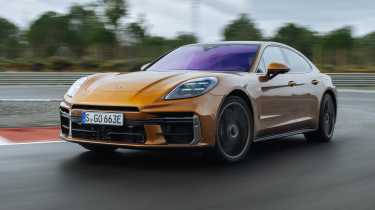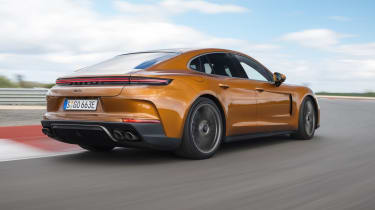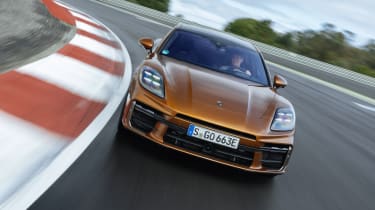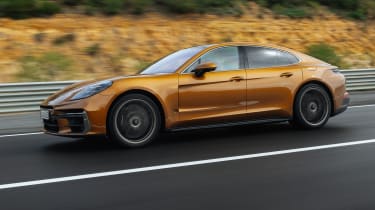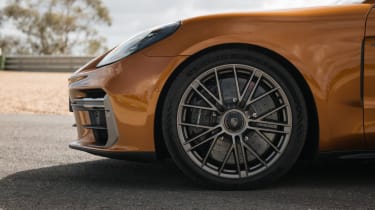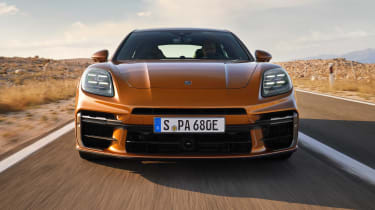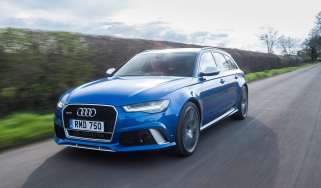Porsche Panamera 2024 review – third-generation super-limo is a tech-fest
A subtle restyle masks significant technical changes as Porsche’s luxury saloon enters its third generation
Our first experience in the third-generation Porsche Panamera is on neither road nor race circuit (though we’ll drive it on both in a few hundred words’ time) – it’s on a wooden platform. Roughly 50 metres long, it’s interspersed with up-and-down ramps at staggered intervals to upset the car as it drives over them; the sort of bumps that’d really make your and your passengers’ heads swing uncomfortably if you ran over them on the road. We’re instructed over the radio to drive along the platform at 50kph (31mph). And… the Panamera is smooth. Very smooth. There’s a bit of a jiggle through the car and a muted thump as the wheels wallop against the ramps, but it’s a distant sensation.
This is our first taste of the Panamera’s flagship air suspension technology: the optional Porsche Active Ride system. All Panameras ride on sophisticated air suspension as standard, but hybrid models have the option of the new active system – made possible by their 400V electronic architecture. It adds around £7k to the car’s price. Each damper is connected to an electrically driven hydraulic pump, and the system has the capability to keep the car almost entirely flat while cornering or dealing with bumps; in fact in certain circumstances the suspension can ‘overcompensate’ for weight transfer, with the ability to carve into corners in a manner akin to a motorcycle. In an extreme situation it can exert as much as 1000kg of force at each corner, though Porsche’s engineers say it would rarely exceed 200kg or so in most driving scenarios.
More reviews
In-depth reviews
Long term tests
Reviews
> The next Porsche Cayenne will be electric, but petrol and hybrid models will live on
It’s actually more dramatic to watch the process from outside the car, each wheel moving up and down in its arch as the Panamera runs down the knobbly runway while its body stays uncannily still, especially compared with a Panamera with the standard suspension, which is shaken around as you’d expect (though it’s still smoother than an average car).
The optional chassis tech is one of many technical highlights in this thorough Panamera overhaul. Although it doesn’t look dramatically different from the Mk2, and features some carryover elements – the doors, for example – roughly 70 per cent of its components are all new. It’s far more than a facelift and justifies being considered a new generation in its own right.
Interior
Visually, one of the biggest changes is the much higher front wings, giving a more classical ‘sports car’ style view down the bonnet from the driver’s seat. The interior has been made slightly less trad-sporty by relocating the gear selector to the dashboard, à la Taycan, which has freed up space for a new centre console that blends digital displays with physical switches (thankfully) for the air-con system (which operates through a new, louvre-free vent system in the dashboard).
A new 12.6-inch curved digital instrument panel is joined by a 10.9-inch display for passengers. Shutter tech means you can’t see the passenger screen from the driver’s seat, just a blank glossy surface with the odd fingerprint. There are a few surprisingly scratchy plastics lower down in the cabin, on the B-pillar and sill, but overall the fit, finish and sense of quality are as impressive as you’d expect of a luxury Porsche.
Engine, gearbox and technical highlights
The new line-up begins with the 348bhp, 369lb ft 2.9-litre V6 rear-wheel-drive Panamera and all-wheel-drive Panamera 4 derivatives, starting at £79,500 and £82,500 respectively. Hybrid models kick off with the V6 Panamera 4 E-Hybrid at £91,000. The range-topping (for now) Panamera Turbo E-Hybrid V8 is monstrously powerful, with 671bhp, 684lb ft and a £141,400 list price. An even faster Turbo S E-Hybrid variant is expected to follow, though is yet to be officially confirmed at the time of writing. There’s no longer an estate-style Sport Turismo version. Insiders hint that the decision to drop it was a contentious one within the company but, in the cold light of day, it simply wasn’t a big enough seller to justify another generation.
The 4-litre V8 in the Turbo E-Hybrid is cleaner and more powerful than before, with higher injection pressure, new pistons (in deference to a higher compression ratio), new single-scroll turbos, and now with cylinder deactivation, well, deactivated: Porsche’s engineers found customers only got the best benefit from it in a relatively narrow field of circumstances. The new, finer valve-lift control is better for overall efficiency across all driving scenarios apparently. This evolution of the V8 had its debut in the new Cayenne and will feature in wider Volkswagen Group products – expect it to appear in Bentleys and Lamborghinis, for example, in the near future. Ditto the active suspension tech.
A new PDK gearbox integrates the hybrid electric motor completely into its casing, helping to enable that monster torque output. In electric-only mode, it’s now possible to drive at up to 87mph for longer periods than before thanks to improved heat management.
What's it like to drive?
We’re not able to sample the new hybrid system and its optional active suspension on the road – that will have to wait for another day – but we are able to try it around the Monteblanco circuit, west of Seville. It’s sopping wet, and an enormous rooster-tail of spray streams from the 911 pace car ahead, but the Panamera’s all-wheel drive and Michelin Pilot Sport S 5 tyres find plenty of traction. The handling balance is reasonably predictable in the fast corners, though you are conscious there’s a lot of momentum at work (the official kerb weight is 2360kg). Brake pedal feel on ceramic brakes – a £7k-plus option – is very good on-track but feels a little inconsistent at lower speeds, as is sometimes the case with hybrids. We’ll reserve judgement until we experience them for longer on the road.
As for the Active Ride suspension, in Sport and Sport Plus drive modes the system does not overcompensate (as it were) for the body’s movements: Porsche’s engineers felt drivers might find a total lack of body roll or pitch disconcerting when driving quickly. So there is conventional diving under braking, squatting under power and roll through the corners, albeit tightly contained and controlled. Unsurprisingly, the Panamera handles the kerbs smoothly, too.
It’s in Comfort mode where it can counteract the body’s movements, sitting the rear up to counteract squat under acceleration and so on. Each corner of the suspension operates independently and the system allows the rear anti-roll bars to be deleted entirely (the new system supersedes the 48V active stabilisers on the previous Panam). The body remains serenely flat while you throw the car left and right. It doesn’t feel unnatural, however; you sense that even in this mode Porsche has deliberately allowed a certain level of body movement to retain some level of feedback as you’d expect. In a separate area, we try emergency braking and avoidance manoeuvres back-to-back in two Panameras with and without Active Ride. As a driver (and particularly as a passenger) you’re thrown around far more in the standard-suspension car and it’s easier to plot a route in an extreme avoidance-style scenario in the active car.
Incidentally, the Active Ride system has one more party piece: ‘Comfort Entry’ raises the car by 55mm on its suspension to help you climb in or out smoothly, and it sinks back to its regular ride height once you close the door.
On the road, we drive the entry-level V6-engined car in rear- and all-wheel-drive forms – without the party-piece suspension. Body control in both examples is still excellent: you’re very aware, straight away, that you’re driving a large car, but you soon feel comfortable with its dimensions. In fact, the quicker you go, the tighter and more adept they feel.
The standard air suspension uses conventional anti-roll bars. Like the active system, it benefits from two-valve adaptive dampers, allowing the ability to adjust rebound and compression independently. The air springs have two chambers whereas the Active Ride system uses a single, larger chamber. The updated suspension along with increased sound-deadening (Porsche has been keen to improve rear-seat refinement, pointing microphones at all angles in the back during development to work out ways to cut road noise) mean it’s not a lighter car than before; the V6-engined Panamera and Panamera 4 have quoted kerb weights of 1885kg and 1920kg respectively, but they handle their considerable bulk beautifully.
At low speeds, ride quality is excellent; at higher speeds, on the optional 21-inch wheels fitted to the two-wheel-drive Panamera, there’s a bit of surface patter and the secondary ride isn’t quite as buttery-smooth, but it’s still a very comfortable car. The Panamera 4 is on the smaller, standard 20-inch wheels and rides more pliantly. At regular road speeds there’s not a dramatic difference in dry-weather cornering between the two, with a little more steering heft in the front-driveshaft-equipped car.
The V6 isn’t as brutally fast as the V8 hybrid, but it’s certainly quick enough, and it’s a smooth engine too. The optional sports exhaust makes a fairly noticeable burbly rumble when you accelerate, but overall it’s a quiet, refined car, as per its remit.
I can’t say it’s a car for which you’d set an early alarm and create drives that will stay in your memory forever, but it is an enjoyable car to steer. Steering and brake feel are both better than you’d typically encounter in a luxury car, and you can drive the Panamera with precision.
Luxury cars have traditionally been at the vanguard of technology debuts. The Panamera was one of the first cars in its sector to feature a dual-clutch transmission and plug-in hybrid power. Active Ride has been applied to the new Taycan, too, and will be mapped across to luxury cars in other brands in the VW portfolio.
The strengths of the previous-generation car remain intact, and in the 2024 hinterland between pure combustion, hybrid and pure-electric power, Porsche’s Panamera remains a car with a unique set of attributes.
Prices, specs and rivals
The entry level rear-drive V6 Panamera starts at £79,500 in the UK, and the Panamera 4 £82,500. The V8 hybrid Porsche Panamera Turbo E-Hybrid is £141,400 before options.
Starting with the visual changes versus the previous Panamera, the fresh headlights sit within front wings which are more pronounced in shape with a higher uppermost point (sitting from behind the wheel, there’s a more distinctive view down the bonnet than before) and an upper central intake above the numberplate is a new feature of the nose. The interior has been overhauled, too, more details on which are in the Interior and Tech section later in this review.
One of the headline technical advances is the new adaptive as standard, active as an option, air suspension system. All Panameras ride on air springs as standard, but hybrid models have the option of the new Porsche Active Ride system, made possible by the hybrid cars’ 400V electronic architecture. This system has the capability to keep the car almost entirely flat while cornering; in fact, it can ‘overcompensate’ for weight transfer, with the ability for the suspension to carve into corners akin to the manner of a motorcycle in certain circumstances.
‘Comfort Entry’ raises the car by 55mm on its suspension to help you climb in or out smoothly, and it sinks back to its regular ride height once you close the door.
The 4-litre V8 engine fitted to the Panamera Turbo E-Hybrid has been thoroughly overhauled, too, being cleaner and more powerful than before, and there’s a new PDK gearbox which integrates the hybrid electric motor completely into its casing. This has helped enable that eye-opening 680+lb ft peak torque output.
Porsche has also worked to improve the Panamera’s comfort in terms of noise and refinement as well as ride comfort, positioning microphones at every angle in the rear seat section of the cabin during testing to find ways of making it a more serene place to travel.
The Panamera has always been an unusual car in the limo sphere, being focused as much on the driver as its passengers. Softer, cushier, more traditional luxury competitors include the Audi S8 and the Mercedes S-Class (which includes an AMG S63 E Performance plug-in hybrid version with peak torque to dwarf even the Panamera Turbo E-Hybrid, at 1054lb ft).
Porsche Panamera Turbo E-Hybrid 2024 specs
| Engine | V8, 3996cc, twin-turbo, plus 140kW electric motor |
| Power | 671bhp |
| Torque | 686lb ft |
| Weight | 2360kg (289bhp/ton) |
| Tyres | Michelin Pilot Sport S 5 |
| 0-62mph | 3.2sec |
| Top speed | 196mph |
| Basic price | £141,400 |
This story was first featured in evo issue 321.
